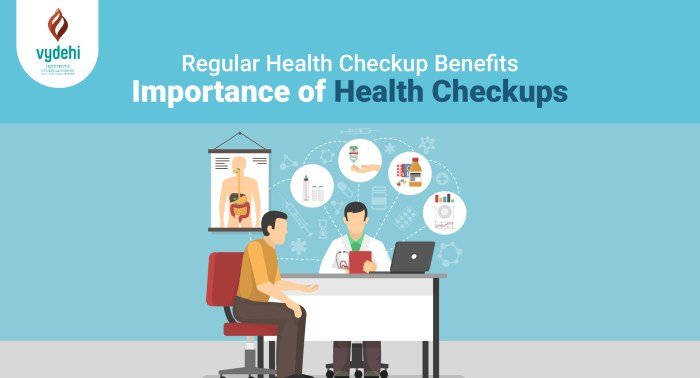Periodic health assessments, a cornerstone of preventative healthcare, offer a proactive approach to maintaining well-being. These regular checkups serve as a vital tool for early detection of potential health issues, enabling timely intervention and maximizing overall health outcomes.
Imagine a world where you can identify health risks before they become major concerns. Periodic health assessments empower you to take charge of your health, understand your body’s signals, and make informed decisions about your well-being.
What is a Periodic Health Assessment?
A periodic health assessment, also known as a checkup or routine screening, is a regular evaluation of your overall health and well-being. It’s a proactive approach to identifying potential health problems early, when they are often easier to treat and manage.
The purpose of a periodic health assessment is to:* Monitor your health status:By tracking your vital signs, such as blood pressure, heart rate, and weight, healthcare professionals can identify any changes or trends that might indicate a health issue.
Detect early signs of disease
Regular screenings can help catch diseases like cancer, diabetes, and heart disease in their early stages, when they are often easier to treat.
Promote healthy habits
Periodic health assessments are crucial for identifying potential health risks early on. These assessments often form the basis for a community health improvement plan , which aims to address health issues at a broader level. Understanding individual health needs through periodic assessments allows for more effective community-wide initiatives that promote overall well-being.
Periodic health assessments can provide an opportunity for healthcare professionals to discuss lifestyle choices, such as diet, exercise, and smoking, and provide guidance on how to make healthier choices.
Identify risk factors
By understanding your family history and personal health risks, healthcare professionals can help you take steps to prevent or manage potential health problems.
Common Health Assessments
Regular health checks are crucial for maintaining good health and preventing serious illnesses. Some common health assessments include:* Blood pressure checks:This measures the force of blood against the walls of your arteries. High blood pressure can increase the risk of heart disease, stroke, and other health problems.
Cholesterol tests
This measures the amount of cholesterol in your blood. High cholesterol levels can increase the risk of heart disease.
Mammograms
These are X-rays of the breast that can detect early signs of breast cancer.
Pap smears
This test screens for cervical cancer, which is a type of cancer that affects the cervix, the lower part of the uterus.
Colorectal cancer screening
This test screens for colorectal cancer, which is a type of cancer that affects the colon and rectum.
Periodic health assessments are crucial for maintaining overall well-being, and understanding how your body responds to exercise is a key part of that. If you’re considering Orangetheory Fitness, you might find the reddit orangetheory fitness community a valuable resource.
It’s a great place to learn about the program’s benefits, potential challenges, and real-life experiences. This kind of information can help you make informed decisions about your health and fitness goals.
Dental checkups
Regular dental checkups can help prevent tooth decay, gum disease, and other oral health problems.
Vision tests
Regular vision tests can help detect eye problems early, such as glaucoma and cataracts.
Hearing tests
Regular hearing tests can help detect hearing loss and other ear problems.
Benefits of Periodic Health Assessments

Periodic health assessments offer a proactive approach to maintaining your well-being. By regularly checking in with your health, you gain valuable insights that can significantly impact your overall health and longevity.
Early Detection of Health Problems
Early detection is key to effective treatment and improved health outcomes. Regular health assessments allow healthcare professionals to identify potential health issues before they become serious. This early identification enables prompt intervention, potentially preventing complications and improving your chances of a successful recovery.
Preventing Chronic Diseases
Chronic diseases like heart disease, diabetes, and cancer are often preventable or manageable with early detection and lifestyle modifications. Periodic health assessments provide an opportunity to identify risk factors for these conditions and implement preventative measures.
For example, regular blood pressure and cholesterol checks can identify early signs of cardiovascular disease, allowing you to make lifestyle changes or start medication if necessary.
Taking care of your physical health is essential, and periodic health assessments can help you stay on top of your well-being. While you’re focusing on your health, why not treat yourself to a little pampering? Check out beauty salon near to me to find a relaxing spot close by.
Once you’ve had a day of rejuvenation, remember to schedule those regular health checks to keep your body in tip-top shape.
Who Needs Periodic Health Assessments?

Everyone benefits from periodic health assessments, but certain groups require them more frequently than others. These assessments help identify potential health issues early, allowing for timely interventions and better management of chronic conditions.
Age Groups and Specific Needs
Different age groups have distinct health concerns, requiring tailored assessments.
- Children and Adolescents:Regular checkups are crucial for monitoring growth and development, detecting early signs of chronic conditions like asthma or diabetes, and addressing potential developmental delays. Immunizations and dental care are also essential during these formative years.
- Young Adults (18-35):This group may be less prone to chronic conditions but should focus on maintaining a healthy lifestyle, including regular exercise, balanced nutrition, and safe sexual practices. Screenings for sexually transmitted infections and mental health assessments are also important.
- Middle-Aged Adults (35-65):This group experiences increased risk of chronic conditions like heart disease, diabetes, and cancer. Regular screenings for these conditions, along with blood pressure and cholesterol checks, are essential. Women should also have regular mammograms and Pap smears.
- Older Adults (65+):Age-related health issues like osteoporosis, arthritis, and dementia become more prevalent. Regular checkups for these conditions, along with cognitive function assessments, are crucial for maintaining overall health and independence.
Lifestyle Factors and Assessment Frequency
Lifestyle factors significantly influence the frequency of recommended health assessments.
- Smoking:Smokers have a higher risk of lung cancer, heart disease, and other respiratory issues. They should have more frequent checkups, including lung function tests.
- Obesity:Being overweight or obese increases the risk of heart disease, diabetes, and some types of cancer. Regular checkups and lifestyle modifications are essential for managing these risks.
- Family History:Individuals with a family history of certain conditions, such as heart disease, diabetes, or cancer, should have more frequent screenings for those conditions. Early detection and intervention can significantly improve outcomes.
Family History and Assessment Requirements
Family history plays a crucial role in determining individual assessment needs.
- Genetic Predisposition:A family history of certain conditions can indicate a higher genetic predisposition. For example, individuals with a family history of breast cancer may need more frequent mammograms or genetic testing.
- Early Onset:If a family member developed a condition at a young age, it may suggest an increased risk for the individual. This can influence the timing and frequency of screenings.
Types of Periodic Health Assessments

Periodic health assessments can vary depending on your age, gender, family history, and overall health status. They can be tailored to your specific needs and risk factors. Here’s a breakdown of different types of assessments and their frequencies:
Basic Health Assessments
Basic health assessments are typically recommended for most adults and are usually conducted annually. These assessments cover essential health parameters, including:
- Medical history:This includes a review of your past illnesses, surgeries, medications, allergies, and family history of diseases.
- Physical examination:This involves checking your height, weight, blood pressure, heart rate, and temperature. Your doctor may also listen to your heart and lungs, examine your skin, and check your reflexes.
- Lab tests:These may include a complete blood count (CBC), urinalysis, and blood chemistry panel to assess your overall health and detect any potential abnormalities.
The role of healthcare professionals in recommending and conducting basic health assessments is crucial. They can identify any potential health concerns early on and recommend appropriate preventive measures.
Age-Specific Assessments, Periodic health assessment
As you age, your health needs change, and specific assessments are recommended for different age groups.
- Children and Adolescents:Regular checkups are crucial for monitoring growth and development. These assessments may include vaccinations, vision and hearing tests, and screenings for conditions like scoliosis and obesity.
- Adults (20-40 years):This age group often focuses on screenings for sexually transmitted infections (STIs), reproductive health, and early detection of cancer. Regular checkups also include monitoring blood pressure, cholesterol levels, and other cardiovascular risk factors.
- Older Adults (50+ years):As individuals age, they are at higher risk for chronic diseases. Assessments may include screenings for osteoporosis, colorectal cancer, prostate cancer (men), breast cancer (women), and other age-related conditions.
Healthcare professionals play a vital role in recommending age-specific assessments, ensuring that individuals receive the appropriate screenings and preventive care at each stage of life.
Specialized Assessments
In addition to basic and age-specific assessments, certain specialized assessments are recommended for individuals with specific health conditions or risk factors.
| Assessment Type | Frequency | Description |
|---|---|---|
| Cardiovascular Assessment | Annually or as recommended by your doctor | This assessment includes blood pressure, cholesterol levels, and electrocardiogram (ECG) to evaluate heart health. It may also involve stress tests or echocardiograms for individuals with known heart conditions. |
| Diabetes Assessment | Annually or as recommended by your doctor | This assessment includes blood glucose testing to monitor blood sugar levels and assess diabetes risk. It may also involve HbA1c testing to measure long-term blood sugar control. |
| Mental Health Assessment | As needed | This assessment involves a discussion with a mental health professional to evaluate your mental well-being. It may include a screening for anxiety, depression, or other mental health conditions. |
Healthcare professionals can recommend specialized assessments based on your individual health history, risk factors, and symptoms. They play a crucial role in identifying potential health issues and providing appropriate treatment and management strategies.
Preparing for a Periodic Health Assessment

Preparing for your periodic health assessment can help ensure a more productive and insightful experience. It allows you to make the most of your time with your healthcare provider and get the most relevant and helpful information.
Gathering Relevant Information
It’s crucial to gather all relevant medical information before your appointment. This helps your healthcare provider understand your health history better and make informed decisions about your care. Here’s what you should do:
- Make a list of all medications you’re currently taking, including over-the-counter medications, vitamins, and supplements. Note the dosage and frequency of each medication.
- Gather your medical records from previous appointments, including lab results, imaging reports, and any other relevant documents.
- If you have any specific concerns or questions you want to discuss with your healthcare provider, write them down in advance. This will help you remember everything you want to ask during your appointment.
Being Honest with Your Healthcare Provider
Being honest with your healthcare provider about your health history is essential. This includes discussing any past illnesses, surgeries, allergies, family history of diseases, and current lifestyle habits, such as smoking, alcohol consumption, and exercise.
Being open and honest with your healthcare provider is crucial for accurate diagnosis and treatment.
- Sharing information about your health habits, even if you feel embarrassed, can help your healthcare provider understand your overall health and identify potential risks.
- Honesty allows your healthcare provider to provide the best possible care and tailor treatment plans to your specific needs.
Preparing a Checklist
Creating a checklist can help you stay organized and ensure you don’t forget anything important before your appointment. Here’s a sample checklist:
- Schedule your appointment in advance.
- Gather your medical records and medication list.
- Write down any questions or concerns you have.
- Bring a list of your current symptoms, if any.
- Plan to wear comfortable clothing that allows for easy access to your body if needed.
- Arrive at your appointment on time, allowing for potential traffic or delays.
Understanding Assessment Results

Your periodic health assessment results provide valuable insights into your current health status and potential risks. Understanding these results is crucial for making informed decisions about your health and well-being.
Interpreting Assessment Results
Your healthcare provider will review your assessment results with you, explaining what each finding means and its potential implications. They will discuss any abnormal results, and work with you to create a personalized plan for managing your health.
- Normal Results: Normal results indicate that your health is within the expected range for your age, gender, and lifestyle. This doesn’t necessarily mean you’re completely healthy, but it’s a good sign that your current health practices are working.
- Abnormal Results: Abnormal results may indicate a health concern that requires further investigation or treatment.
Your healthcare provider will discuss the specific findings and recommend next steps.
Common Findings and Recommendations
Here are some examples of common findings and their associated recommendations:
- High Blood Pressure: Your healthcare provider may recommend lifestyle changes, such as losing weight, reducing salt intake, and exercising regularly. They may also prescribe medication to manage your blood pressure.
- High Cholesterol: Your healthcare provider may recommend lifestyle changes, such as a heart-healthy diet and regular exercise.
They may also prescribe medication to lower your cholesterol levels.
- Elevated Blood Sugar: Your healthcare provider may recommend lifestyle changes, such as weight loss, a healthy diet, and regular exercise. They may also prescribe medication to manage your blood sugar levels.
Role of Healthcare Providers
Your healthcare provider plays a crucial role in explaining your assessment results and providing guidance. They will:
- Review your assessment results with you in detail.
- Answer any questions you may have about your results.
- Discuss the potential implications of your results.
- Develop a personalized plan for managing your health based on your individual needs.
Maintaining a Healthy Lifestyle

Regular periodic health assessments are essential, but they are only one piece of the puzzle when it comes to maintaining optimal health. Living a healthy lifestyle between assessments is crucial to prevent health issues and improve your overall well-being. This involves making positive changes to your daily habits, focusing on key areas like diet, exercise, and stress management.
Diet
A balanced diet provides your body with the nutrients it needs to function correctly.
- Focus on consuming plenty of fruits, vegetables, whole grains, and lean proteins.
- Limit processed foods, sugary drinks, and unhealthy fats.
- Stay hydrated by drinking plenty of water throughout the day.
These simple dietary changes can significantly impact your health, reducing the risk of chronic diseases such as heart disease, diabetes, and certain types of cancer.
Exercise
Regular physical activity is essential for maintaining a healthy weight, strengthening muscles and bones, and improving cardiovascular health.
- Aim for at least 150 minutes of moderate-intensity aerobic activity or 75 minutes of vigorous-intensity aerobic activity per week.
- Incorporate strength training exercises into your routine at least twice a week.
- Find activities you enjoy to make exercise a sustainable habit.
Even small changes, like taking the stairs instead of the elevator or going for a walk during your lunch break, can contribute to your overall fitness.
Stress Management
Chronic stress can negatively impact both physical and mental health.
- Practice stress-reducing techniques like deep breathing exercises, meditation, or yoga.
- Get enough sleep, as it allows your body to rest and repair itself.
- Spend time in nature, which can help reduce stress and improve mood.
- Seek support from friends, family, or a therapist when needed.
Finding healthy ways to manage stress is essential for maintaining a balanced and fulfilling life.
Ultimate Conclusion
Embracing periodic health assessments is an investment in your future. By proactively monitoring your health, you empower yourself to live a longer, healthier, and more fulfilling life. Remember, knowledge is power, and regular assessments provide the knowledge you need to make informed choices about your well-being.
Question Bank: Periodic Health Assessment
How often should I have a periodic health assessment?
The frequency of assessments varies based on age, family history, and lifestyle factors. It’s best to consult with your healthcare provider to determine a personalized schedule.
What if I don’t have any symptoms? Do I still need an assessment?
Yes, even if you feel healthy, regular assessments can detect early signs of conditions that might not yet be causing symptoms. Early detection often leads to more effective treatment options.
What types of tests are typically included in a periodic health assessment?
Assessments often include blood pressure checks, cholesterol tests, blood sugar tests, and other screenings depending on your age, risk factors, and medical history.
Are periodic health assessments covered by insurance?
Most insurance plans cover at least some preventative health screenings. Check with your insurance provider for specific coverage details.